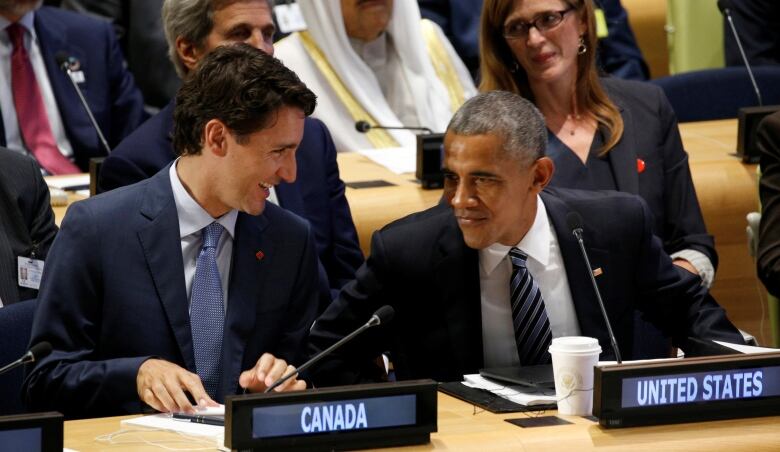APEC summit: Trudeau seeks to save trade deals in Peru
PM will meet Presidents Barack Obama, Enrique Pena Nieto on sidelines of Asia-Pacific summit

The trading partners of APEC meet at a moment in history when the very concept of free trade appears to be in retreat. And rather than bold new pronouncements of tariffs tumbling and treaties being signed, the leaders gathering in Peru this weekend aim only to save as much of the furniture as they can.
First in the Brexit referendum in the U.K., and then in the U.S. primary campaign, where candidates of both parties pledged to tear up the recently negotiated Trans Pacific Partnership (TPP), voters have shown a new and unexpected hostility to the idea that freer trade and fewer barriers translate into greater prosperity.
But for Canada in particular, the greatest shock has been the election of a U.S. president who not only rejects the TPP but has also signalled he's willing to withdraw from NAFTA unless he can force his North American partners to agree to terms more favourable to the U.S.
- Realities of governing may temper Trump's hard line, Trudeau tells Argentine business leaders
- Is Trump's tough talk on trade all bluster? Business leaders shouldn't wait to find out
In Argentina on Thursday, Prime Minister Justin Trudeau minimized the Donald Trump threat to North American free trade.
"When I say that I'm open to talking about NAFTA, open to talking about trade deals, that's the way I govern. I'm always open to talking about whatever people want to talk about," he said.
When I say that I'm open to talking about NAFTA, open to talking about trade deals, that's the way I govern.- Prime Minister Justin Trudeau
"The fact is that NAFTA has been amended and tweaked and improved and adjusted a dozen times over the past 20 years, so we're always looking at opportunities to make it better and stronger."
But while being careful to avoid criticizing the incoming U.S. administration, Trudeau also used his joint news conference with Argentine President Mauricio Macri to signal his own difference of opinion with Trump.
"The president-elect in the United States certainly heard and felt and drew on the anxiety and the anger that people are feeling about why the economy is not working. But I am also very, very confident that if you are serious about creating growth that works for the middle class that is struggling, you need to do it through progressive, responsible trade deals."

Both Trudeau and Macri referred to the visit as the beginning of a new strategic alliance between two trading nations that still believe in lowering barriers to commerce.
And starting Saturday in Lima, Trudeau will meet other leaders with a view to both protecting NAFTA and salvaging what can be salvaged of the TPP.
Those efforts include a meeting with the country most directly threatened by the rhetoric of Trump: Mexico. Trudeau will sit down with President Enrique Pena Nieto, who has taken a similar line in public to that of the Canadian PM, expressing his openness to revisiting the terms of the North American accord.
Trudeau, Obama to meet privately
Helpfully, the 21 members of APEC include all 12 signatories of the TPP: Canada, the U.S., Mexico, Chile, Peru, Japan, Australia, New Zealand, Malaysia, Vietnam, Singapore and Brunei.
All 12 nations will attend a noon-hour meeting Saturday hosted by President Barack Obama, whose visit to Lima is his last overseas trip before he hands over the keys to the Oval Office.

Obama and Trudeau will meet again, privately, on Sunday, according to the White House.
But even Obama will have to recognize that Trump has the power to kill the whole TPP as it is currently written. That's because it only comes into effect when ratified by states that together make up at least 85 per cent of the total GDP of signatory countries. Without the massive economy of the U.S., that is an impossible goal.
Plan B, if multilateral trade deals prove impossible in the coming years, is for Canada to pursue bilateral trade with the same nations that would have formed the TPP.
Trudeau has booked bilateral meetings with the leaders of three other TPP nations: Peru and Vietnam Saturday, and Australia on Sunday.
The visit to Latin America represents another possible response to a United States that is intent on building walls. That is to look to a region that Canada has historically tended to ignore: the other half of the Americas.
"The alignment that I'm seeing between the values of not just Argentines but, indeed, Latin Americans in general, and where Canada wants to go, what role Canada wants to play in the world, is a tremendous opportunity," Trudeau said.
"We need to think beyond the United States and engage with Mexico in a positive way and engage beyond Mexico to Latin and South America. These are the things that I think are exciting about the coming years."

